 Petzlover
Petzlover Jindo is originated from South Korea but Lowchen is originated from Germany. Jindo may grow 32 cm / 13 inches higher than Lowchen. Jindo may weigh 15 kg / 34 pounds more than Lowchen. Both Jindo and Lowchen has almost same life span. Both Jindo and Lowchen has almost same litter size. Both Jindo and Lowchen requires Moderate Maintenance.
Jindo is originated from South Korea but Lowchen is originated from Germany. Jindo may grow 32 cm / 13 inches higher than Lowchen. Jindo may weigh 15 kg / 34 pounds more than Lowchen. Both Jindo and Lowchen has almost same life span. Both Jindo and Lowchen has almost same litter size. Both Jindo and Lowchen requires Moderate Maintenance.
 Hailing from Korea, the Jindo dog's name is actually taken from the island Jindo. The dogs lived on the island for thousands of years, developing into a natural breed with good hunting skills.
Hailing from Korea, the Jindo dog's name is actually taken from the island Jindo. The dogs lived on the island for thousands of years, developing into a natural breed with good hunting skills.
They are also known as Jin Dog, Jindo-kae or Jindo-kyon. The exact origins of the Korean Jindo are unknown and it is believed to have been developed from different Mongolian breeds.
They were brought to the United States and been entered into the American Kennel Club.
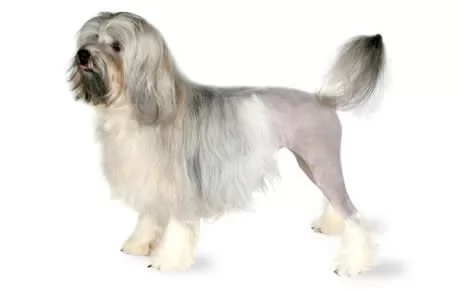 Known as the Little Lion Dog, the Lowchen is considered by some registries as a toy dog and by the American Kennel Club as a non-sporting dog.
Known as the Little Lion Dog, the Lowchen is considered by some registries as a toy dog and by the American Kennel Club as a non-sporting dog.
Nobody seems too certain about the true origin of the dog but most records seem to suggest it originates from Germany, France or Holland.
He was bred to catch rats and mice and his history goes way back to 1442, with images of him being found in engravings and paintings. People think he may be related to the Bichon Frise.
His history shows that apart from being used to catch vermin he was also a companion dog to the wealthy. A breeding program for the dog was started in 1944 and they were later imported to Britain in the late 1960s. The dog was given Kennel Club recognition in the UK in 1971, also appearing in America in 1971 with The Lowchen Club of America being formed.
 The Jindo is a medium sized spitz-type dog breed which is well-proportioned with erect ears and a long tail which is held over the dog's back.
The Jindo is a medium sized spitz-type dog breed which is well-proportioned with erect ears and a long tail which is held over the dog's back.
He stands at roughly 45 – 65cm and they weigh anything between 11 to 23kg. The coat of the dog is medium length and available in a number of colors – yellow, tan, red, white, brindle, black or bi-color such as black and tan.
When you look at the Jindo you get the impression of bright alertness and intelligence. He makes a great watchdog, and with his bright, alert eyes and upright ears, he just looks like he is on guard.
The Jindo has always been a hunting dog so he has learned to be bold, tenacious and alert. He is also brave, courageous, loving and loyal to his master, but you need to know that he is a dominant dog who will get on well with an owner who is fair, strong, patient, kind and firm.
These dogs are strong willed, independent and dominant as well as being intelligent. He will require socialization and training from an early age. Be fair, firm and consistent with your instructions which he will obey once he has been trained. With training he gets on well with children in the home but he is inclined to have some difficulty with accepting other dogs into the family.
As with any dog breed, the temperament of the Jindo will vary according to the environment he lives in and the type of owners he has. The typical Jindo is an affectionate dog with his human family, being a little bit reserved around strangers.
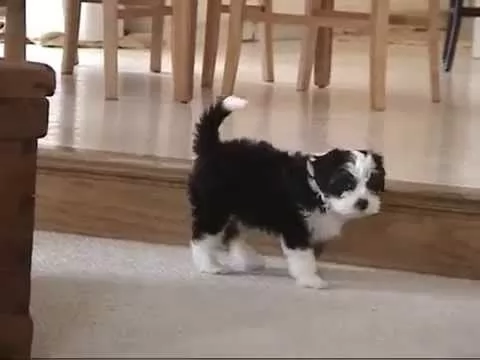 The Lowchen is a small dog but robustly built and stands at between 25 – 33 cm in height and weighs anything from 4 – 8 kg.
The Lowchen is a small dog but robustly built and stands at between 25 – 33 cm in height and weighs anything from 4 – 8 kg.
He has a long coat which is available in a number of colors - cream, white, grey, black, silver and bi-colored. The single coat isn’t like that of the Bichon Frise, thin and fluffy, but is much thicker, silky and wavy and sheds minimally. People love snipping the long coat cut so that the dog looks like a small lion, short over the body and with a mane, with some hair left around the ‘ankle’ parts of the legs.
The tail is also sheared and left with a pom-pom look. People look at him as an ideal pet as he doesn’t shed much and is looked upon as being a hypoallergenic dog.
He has a wide muzzle and broad, flat skull. The ears are floppy with fringing, the eyes dark, round and intelligent looking. The litter size of this dog is is usually between 3 and 6 puppies.
Intelligent, bright, outgoing and affectionate, you won’t find any aggression in this cute little dog unless the owners have treated him so badly that he wants to be aggressive.
He is such an amicable little pet that he won’t cause you any trouble – he just wants to be your friend. He is a social dog, but can be quite timid when introduced to new people.Socialization and training will do wonders for him and give him some confidence.
He just loves receiving attention and is also prepared to give a lot of attention too. Although he can adapt easily to life in the city or the countryside, he wouldn’t like his owners being at work all day and leaving him alone hour after hour. He is gentle with his human family and sees to it that he gets on well with children as well as pets in the home.
 The Jindo makes an awesome pet for owners who enjoy an active lifestyle. A happy, contented Jindo becomes a devoted, loyal pet who wants to guard and protect his owner from strangers, for whom he is wary and reserved.
The Jindo makes an awesome pet for owners who enjoy an active lifestyle. A happy, contented Jindo becomes a devoted, loyal pet who wants to guard and protect his owner from strangers, for whom he is wary and reserved.
He is an intelligent pet too, being easy to train and socialize and while independent, he loves to spend time with his human family and is an all-round excellent pet.
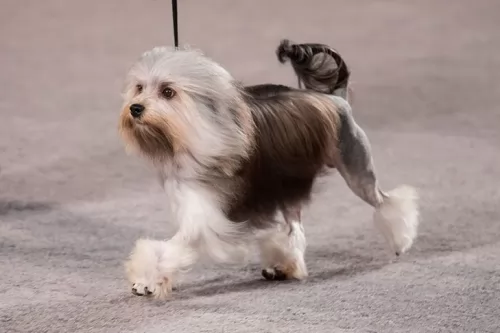 The Lowchen is sure to make anyone a splendid pet as he is friendly, playful, loving and loyal. He is such a good natured pet and will make a wonderful companion, being able to get on well with children and pets in the home.
The Lowchen is sure to make anyone a splendid pet as he is friendly, playful, loving and loyal. He is such a good natured pet and will make a wonderful companion, being able to get on well with children and pets in the home.
He is energetic too and will love to be outside playing games or joining you on a walk. Those who have had the Lowchen as a pet haven’t been disappointed as they all agree that he makes the most amazing family companion.
 The Korean Jindo dog is looked upon as a generally healthy dog breed with no serious genetic problems to talk about. Look out for eye diseases and dental decay as well as hypothyroidism, a common disease in dogs where you notice deterioration with the coat – thinning, dry and dull.
The Korean Jindo dog is looked upon as a generally healthy dog breed with no serious genetic problems to talk about. Look out for eye diseases and dental decay as well as hypothyroidism, a common disease in dogs where you notice deterioration with the coat – thinning, dry and dull.
The dog’s skin also becomes flaky and you’ll notice that your once energetic pet is now gaining weight and is lethargic. Get him to the vet. Hypothyroidism can be treated simply by your vet to get your pet healthy once again.
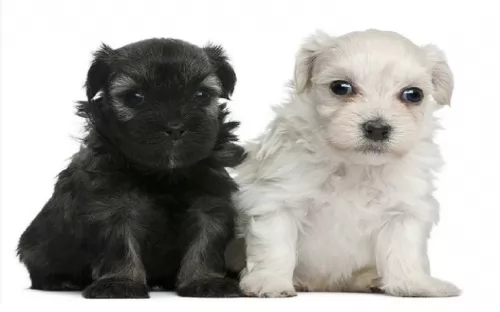 The Lowchen is a healthy dog breed so you aren’t going to be spending too much money with him at the vet. Some health concerns with this particular dog breed are cataracts and patellar luxation.
The Lowchen is a healthy dog breed so you aren’t going to be spending too much money with him at the vet. Some health concerns with this particular dog breed are cataracts and patellar luxation.
It can be so sad witnessing your dog’s bright, alert eyes clouding over. Dogs have clear lens, but cataracts, while not painful, can impair vision and actually lead to complete vision loss. As the eye disease progresses, the lens can become completely opaque.
This occurs when the kneecap of the dog is dislocated from its normal position. You’ll see your dog holding up his hind leg every now and then. It can only be returned to its normal position once the quadriceps muscles of the dog relax.
This is a common knee joint problem in dogs and it can lead to arthritis. He will need to get to the vet.
 The Jindo has a double coat and this sheds heavily about twice a year, so certainly during these shedding periods you will need to brush his coat twice a week to keep it free from loose hair.
The Jindo has a double coat and this sheds heavily about twice a year, so certainly during these shedding periods you will need to brush his coat twice a week to keep it free from loose hair.
Never just assume that your dog is healthy and happy. When you brush him, check him over for ticks and fleas, check him for any unusual lumps, make sure his nose is wet and that his eyes are bright. Look at the condition of his fur, check his teeth and inside his ears – there are lots of tell-tale signs that can indicate that all is not well with your pet and then you need to get him to the vet.
As a medium-sized breed, if you feed your dog commercially manufactured food, he will require a high quality food that has been formulated for a dog of his size and his activity levels. Mix some home-made cooked chicken, brown rice or pasta as well as vegetables into his kibble and try to include some raw meat in occasionally too. He needs to always have access to fresh, clean water.
The Jindo is a high energy dog, and with his bright face you can tell that he is always ready for action. Long ago he was bred to perform hunting and retrieving type jobs, and with their stamina, they require having a busy day.
They certainly require a significant amount of exercise and mental stimulation, so you will need to include him in your daily walks and give him exciting ball games.
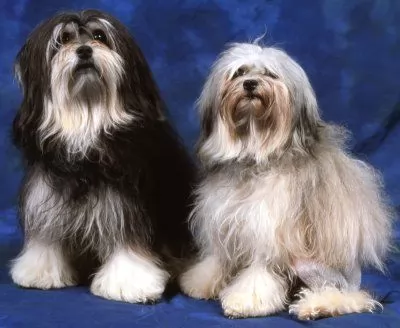 Because your Lowchen is a bright, happy companion dog you want to ensure that you look after him well to ensure his ongoing wellbeing.
Because your Lowchen is a bright, happy companion dog you want to ensure that you look after him well to ensure his ongoing wellbeing.
The single coat is long and you will need to brush him regularly to keep it looking good. If brushing becomes too hectic, you can have him sheared at a professional dog groomer.
Check him over for fleas and ticks while brushing him.
Feel all over his body for the emergence of new lumps.
Clip his nails to ensure they don’t grow long so that they hook on things and tear his flesh.
Check the inside of his ears to make sure there is no sign of redness and ear infection. This can drive your pet mad with the itching. The ears need to be kept clean, as do the teeth and both these can be done for you at professional dog groomers.
Every dog requires exercise and your Lowchen will need games and walks to keep him fit, to ward off obesity and to provide him with something to look forward to.
Make sure to feed your pet wholesome food as good quality food promotes good health and longevity. Give your Lowchen the best quality kibble there is and try and mix in some homemade cooked chicken, brown rice, pasta and cooked or raw vegetables every now and then just to add some tasty variety to your pets diet. Make sure he always has access to fresh, cool water.
Make sure your Lowchen has a warm, dry comfy spot to sleep, and ensue that when he’s outside he has shade to lie down in.